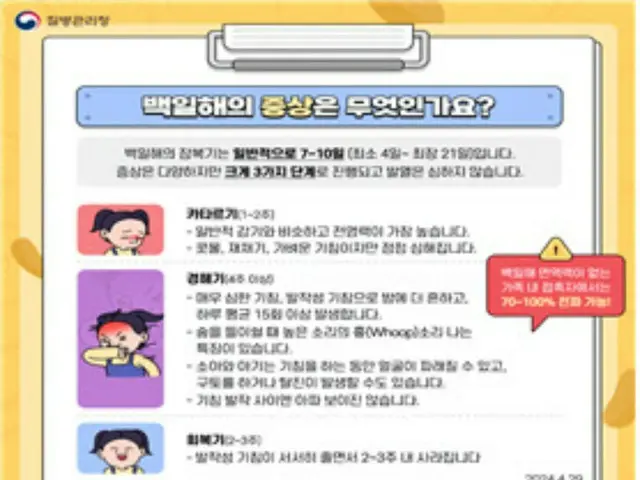On the 7th, the number of patients in 2018, the most recent year of the epidemic, exceeded 980. By age, 49.6% (617 patients) were aged 13-19, and 37.5% (512 patients) were aged 7-12.
Boys accounted for 87.1% (1,129 cases) of the total. By region, Gyeongnam (39.8%, 392 cases), Gyeonggi (17.4%, 17.4 cases), and other areas where cluster outbreaks have been reported in educational facilities are the largest.
The top three cities are: Osaka (143 cases, 8%), Busan (109 cases, 8%), and Gyeongbuk (90 cases, 6.6%). This year, the incidence rate has been increasing worldwide.
As of April 27, 4,864 people were infected, a 2.8-fold increase from the 1,746 cases in the same period last year. In the Philippines, 2,521 people were infected and 96 people died as of April 27. China also recorded 91,272 cases in April.
The number of infected people has increased by about 3.4 times compared to March, and the cumulative death toll this year is 20. In South Korea, the pertussis vaccination rate is 97.3% for 1-year-olds (DTaP 3rd dose), and 10.4% for elementary school-entering students.
The rate of infection was 96.8% (DTaP 5th stage), which is higher than that of other developed countries. In particular, there were few cases of infection in children under the age of one (four cases), who are considered to be at high risk of developing severe symptoms when infected, and the number of deaths in the past 10 years was low.
No cases have been reported, but if the number of cases continues to increase, there is a possibility that the infection could cause severe complications or loss of life.
Therefore, those who have not yet been vaccinated and those who have not completed the six vaccinations are at high risk of contracting and transmitting whooping cough.
It is important that those who have not yet been fully vaccinated receive the vaccine as soon as possible, and close contacts who care for children should receive the Tdap vaccine at least two weeks before coming into contact with children.
Pregnant women and women of childbearing age should also get vaccinated. Ji Young-mi, director of the Korea Centers for Disease Control and Prevention, said of the current whooping cough epidemic, "It is a combination of factors, and the epidemic will likely subside for a while."
"If a student is suspected of having a respiratory infection, including whooping cough, parents and teachers should suspend attendance at school or daycare and encourage them to practice hand washing and cough etiquette in their daily lives," the ministry said.
We request your attention and guidance."
2024/06/07 11:59 KST
Copyrights(C) Edaily wowkorea.jp 85

